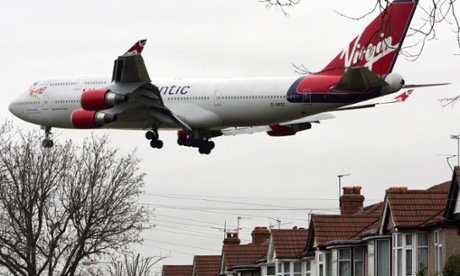British Airways says that it has been forced to shelve a groundbreaking £340m scheme to create 16m gallons of jet fuel from London’s rubbish every year, partly due to a lack of government support.
The shadow transport minister, Richard Burden, pledged to table parliamentary questions about the affair, saying that government backing for the project had been derisory.
The Green Sky project was due to open in 2017 at an ex-oil refinery in Thurrock, Essex, where it would have turned into gas 575,000 tonnes of household waste otherwise destined for landfill sites or incinerators.
Enough green fuel would have been produced to power all BA’s yearly flights from London City airport twice over, with carbon savings equivalent to taking 150,000 cars off the road.
But BA told the Guardian that the project had now been mothballed because of low crude oil prices, jitters among investors, and a lack of policy engagement from 10 Downing Street.
“The government needs to support innovative aviation biofuels projects such as this if they are to progress,” said Cathy West, a BA spokeswoman. “Aviation fuels are not eligible for incentives that road transport fuels receive, making it difficult to build a business case to invest in UK aviation fuels projects. This affects investor confidence.”
“British Airways’ decision to scrap their green fuels project is immensely disappointing,” Burden said. “The government has questions to answer on why it is not looking to support the industry’s innovative attempts to recycle waste to use as fuel.
“At a time when the government has delayed a decision on Heathrow and Gatwick partly for environmental reasons, it is ludicrous that the government is not backing the industry’s attempts to deliver cleaner fuels.”
BA wants jet biofuels brought under the government’s Renewable Transport Fuels Obligation, a move it believes could help trigger the building of a dozen green fuel plants by 2030.
Without such guarantees, airlines may feel obliged to sign alternative fuel deals at market rates that become less attractive when oil prices suddenly drop.
“The UK is currently losing out to countries that have prioritised and incentivised developments in the sustainable aviation fuels market,” West said.
Some 150 workers were expected to staff the Solena Fuels plant, which BA had committed to pay £35m each year for a decade, in a bid to lower its carbon footprint.
But Solena, a US company, filed for bankruptcy three months ago and BA has now switched its attention to other waste-to-fuels firms where joint projects are thought to be at the due diligence stage.
Chris Malins, the fuels programme manager of the International Council for Clean Transportation, said that commercialising these projects was a challenging process, beset by a lack of EU policy certainty after 2020 and a “valley of death” between R&D tests and market-scale production.
“Things could have been done on the policy side here to help these plants get built which were not done,” he said. “Investments won’t go to alternative aviation fuels without policy certainty and access to the same incentives as road diesel.
“It is a shame as this project looked like a great opportunity to do something genuinely sustainable on a ground-breaking scale.”
Aviation is the fastest-growing source of carbon dioxide emissions, currently thought to be responsible for around 5% of global warming by scientists at the UN’s Intergovernmental Panel on Climate Change.
New market mechanisms to green the industry will be debated at an International Civil Aviation Organisation conference later this year. Use of second-generation biofuels to power jets is widely seen as one of the most promising technologies.
A recent study found that BA and Lufthansa were emitting 51% more carbon dioxide than the least polluting airlines.








